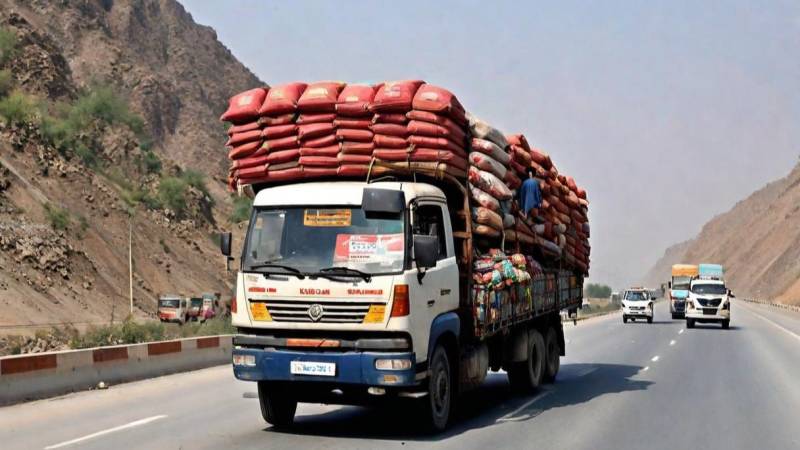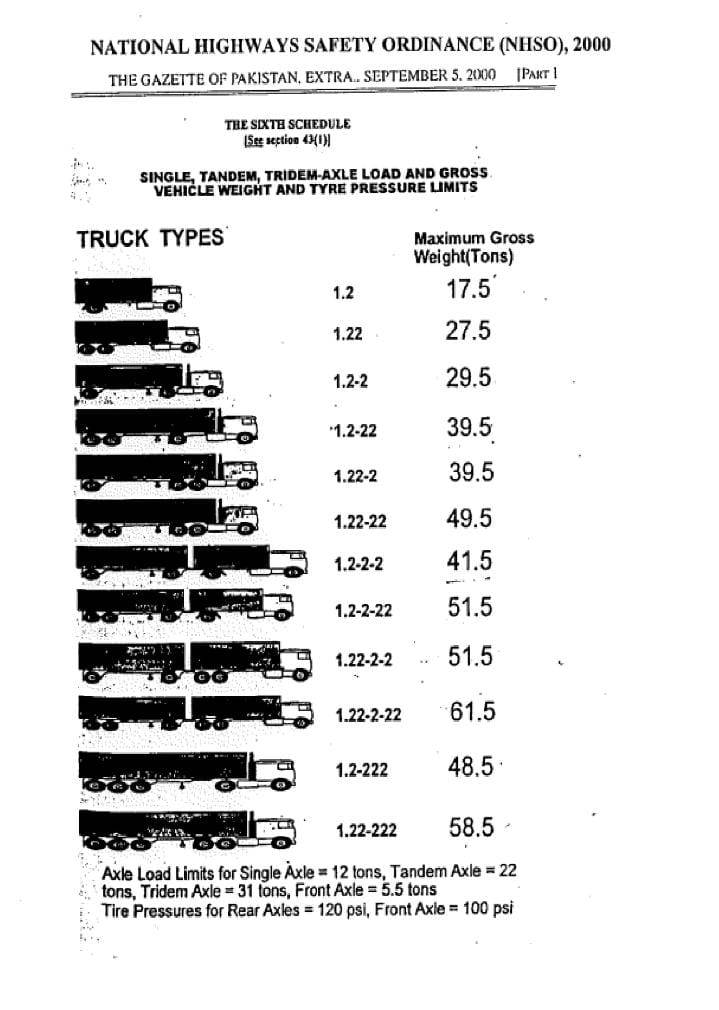
The Supreme Court has been requested to direct the relevant authorities to ensure strict compliance with the country's axle-load (weight/load bearing) laws for trucks to protect public infrastructure from undue destruction and deterioration due to overloaded trucks.
A petition in this regard has been filed under Article 184(3), which urges the top court to direct the authorities to recover from the beneficiaries of this illegality the losses inflicted upon the public exchequer on account of non-compliance with the relevant laws.
The petition comes at a time when many of the first phase of the China Pakistan Economic Corridor (CPEC) projects—including infrastructure and energy projects — have either been completed or are near completion, and the second phase is commencing. The corridor is expected to drastically increase truck traffic on Pakistan's highways.
The top court has further been requested to direct the Islamabad Capital Territory (ICT) administration to conduct thorough research on overloading and formulate a viable solution to address this issue effectively.
The petition was filed by Abbas Afridi, through his counsel Advocate Umer Gillani, arraying the federal government, the National Highway Authority (NHA), the National Highways and Motorway Police (NH&MP), provincial and regional transport authorities, and the National Transport Research Centre as respondents.
The petitioner claims that he has consistently advocated for protecting Pakistan's precious national infrastructure from the "menace" of overloaded commercial vehicles. He argues that roads and bridges in Pakistan represent the single most valuable asset in the state's asset basket.
He added that even a minor contribution towards effectively preserving this infrastructure could save the exchequer billions per year in repairs.
"In Pakistan, billions of rupees are spent on road construction and maintenance each year. Just by way of example, in the year 2022, approximately more than Rs38 billion were spent on the construction of new road and bridge infrastructure in the province of Sindh alone, whereas reportedly Rs53.484 billion were spent on repairs and maintenance across the country," the petition stated.
The petition said that the National Highways Safety Ordinance 2000, was adapted and enforced in the northern areas through the National Highways Safety Ordinance (Adaptation and Enforcement) Order, 2001 and Section 2(iii) of the Ordinance defines "Axle Weight."

Similarly, Section 75 of the Ordinance provides the enforcement mechanism and penalises individuals who drive or permit transport vehicles on national highways with weights exceeding specified limits.
Furthermore, Sections 83 and 43(4) of the Ordinance authorise police officers or authorised individuals to seize vehicles used without valid registration or in violation of weight limits on national highways. This includes exceeding the unladen or laden weights specified in the vehicle's registration certificate, with measures for weighing and storage enforced accordingly.
It cited findings of a study conducted by the National Transport Research Council in December 2020, underscoring persistent challenges with overloading despite longstanding legislation.
Real-time analysis shows accelerated road deterioration, with sections designed for ten years deteriorating in four to five years due to existing conditions.
One contributor to this is the increase in truck traffic composition, which has shifted significantly since 1995, with a rise in multi-axle semi-trailers.
Overloading is most prevalent on national highways, with percentages ranging from 57.87% to 90.62% across different axle configurations. In contrast, motorways with stricter enforcement of weight limits and experiencing less overloading suffer deterioration, with percentages ranging from 4.04% to 11.85%. High tyre pressure also exacerbates road stress.
The petition argued that fines fail to effectively deter overloading and barely cover a fifth of overlay costs. Moreover, safety concerns arise from overloaded vehicles, which hinder traffic flow and compromise emergency braking.
"An entire political economy has developed around this issue. While the general taxpayer loses billions of dollars per year, a group of beneficiaries, including overloading transporters, freighters, and industrialists who manage to save a few pennies on transports, bureaucrats, and other officials who make underhand money from the same, have been manipulating the system to ensure that overloading continues," the petition contended.
According to the petition, data from the Pakistan Bureau of Statistics (PBS) indicates that between 2020 and 2021, 10,429 accidents occurred, resulting in injuries to 12,886 individuals and the unfortunate loss of 5,816 lives.
The petition further contended that if laws regarding overloading and regulations on axle-load are strictly complied with, the people will reap numerous benefits.
"Firstly, billions of dollars spent on repairs and reconstruction of roads will be saved. Secondly, the number of trucks on the roads will increase, as a result of which associated jobs will be created, such as those for drivers, conductors, mechanics, etc.," the petition argued, adding, "Finally, it may be noted that overloaded trucks are a major cause of road traffic accidents. Many people die in these accidents. If axle-load laws were implemented, many passengers' lives would be saved."
It is worth noting that the entrance points to national highways lack weighing scales (kaanta), but the non-availability of these scales is not a major hindrance in implementing the axle-load laws because most of the trucks that leave factories are carefully weighed at the gates of the factories.
Every fiscal year, the federal government allocates a specific budget to the NHA for maintaining roads under its jurisdiction, encompassing approximately 13,570 kilometres.
For the fiscal year 2019–2020, the budget allocated for road maintenance under the NHA was Rs34.493 billion (Public Sector Development Programme for Fiscal Year 2020-21), equivalent to $113.137 million. Based on this data, the petition argued that the NHA expends approximately $8,339 per kilometre annually for the upkeep of its road network.
The petition stated that Pakistan spends nearly $2,047 more per kilometre in contrast to India on road maintenance.
"This implies that the average Pakistani taxpayer bears an additional cost of approximately Rs619,700 per kilometre in the name of road maintenance," it argued.
"This expense could potentially be mitigated through stringent adherence to axle-load laws and addressing the issue of overloading," arguing that road infrastructure is one of Pakistan's most valuable assets, which is intended to be conserved and beneficial for future generations.
"Thus, there is a pressing need for legal measures and interventions that holistically tackle this issue," the petition urged, adding, "Overloading places excessive stress on roads, bridges, and related structures, accelerating their wear and tear far beyond their design capacities."
These practices are also fatal to vehicles, which are prone to operative failure; as a result, road accidents are a common phenomenon, the petition stated.

